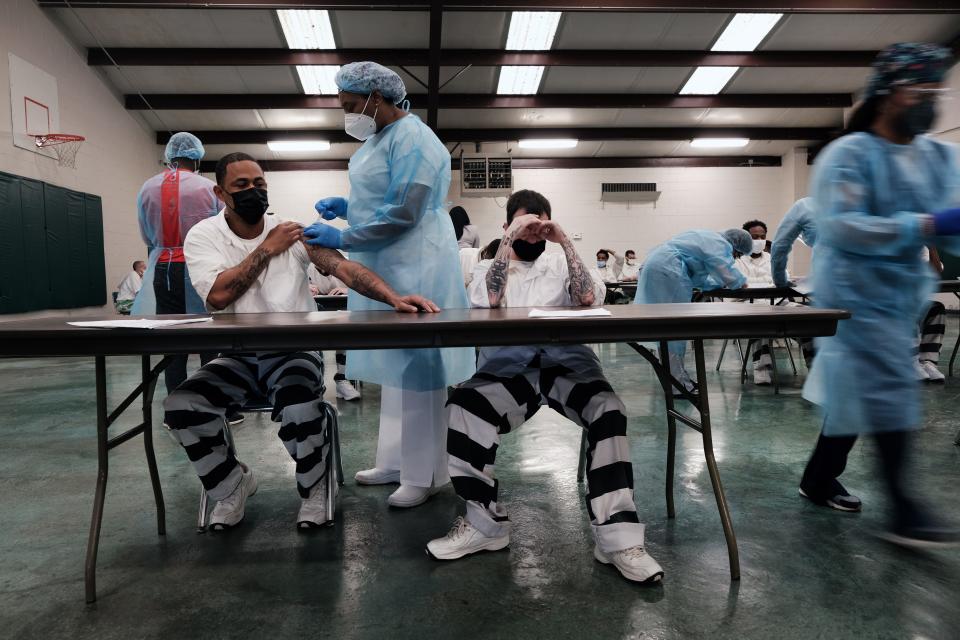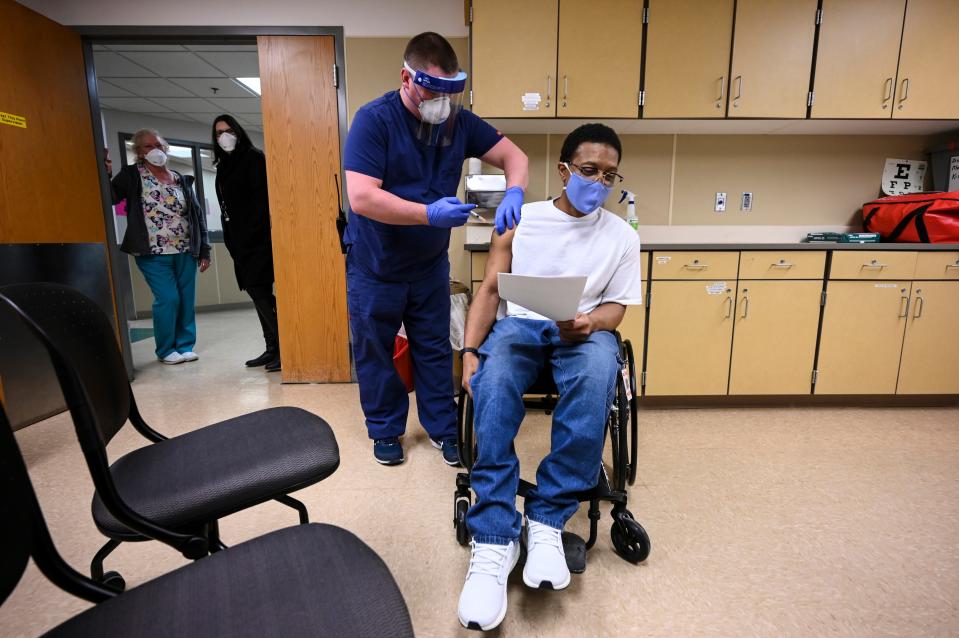'Afraid of dying in here': Inmates fought for COVID-19 vaccinations, protections after jails and prisons failed to protect them
Russell Leaks had more reasons to be worried about the coronavirus than most people.
The 66-year-old Tennessee cook suffers from chronic liver disease, high blood pressure, an irregular heartbeat and the toll of a heart attack. And he was in jail, a place where the virus spreads easily.
Leaks got COVID-19 in late November while awaiting final court action on a parole violation charge. The disease left him so short of breath he could barely talk on the phone with relatives. After receiving what he characterized as minimal medical treatment at the jail, he recovered in early January.
"I felt degraded. I felt like an animal," Leaks said of his health ordeal. "I felt like I was put there to die."

Leaks is among incarcerated people across the country who have fought the danger of COVID-19 by joining their names and experiences with lawsuits over health conditions in jails and prisons. Alleging that their treatment violated the U.S. Constitution, they sued correctional and detention facilities and government officials.
Dozens of cases were filed by American Civil Liberties Union lawyers, local attorneys and large law firms that took them on for free. The suits asked courts to reduce jail and prison populations, eliminate overcrowding that makes social distancing practically impossible or take steps to protect older and medically at-risk detainees, like Leaks. One lawsuit asked a court to prioritize jail inmates for COVID-19 vaccines.
"We just had a sense of, let's try to litigate this disaster, if we can, and help as many people as possible," said Andrea Woods, an ACLU attorney who worked on the Tennessee case that includes Leaks.
As of last week, 27% of prisoners nationwide had received at least one dose of a COVID-19 vaccine, according to data gathered by The Marshall Project and The Associated Press. The data does not include jails, and 31 states did not have current vaccine data.
Handful of lawsuits resulted in stronger protections for inmates
Many of the lawsuits failed, but a few succeeded, helping thousands of incarcerated people – and the corrections officers and administrators who oversee them – avoid getting sick or dying from COVID-19.
In Oregon, a federal lawsuit challenged the constitutionality of the state's decision to prioritize COVID-19 vaccinations for people who live or work in congregate care facilities such as nursing homes, as well as people who work in jails or prisons – but not the incarcerated.
The case, filed by lawyers from the Oregon Justice Resource Center and other civil rights attorneys, alleged violations of prisoners' Eighth Amendment right to be protected from cruel or unusual punishment.
"Our constitutional rights are not suspended during a crisis," U.S. Magistrate Judge Stacie Beckerman wrote in granting a preliminary injunction. "On the contrary, during difficult times we must remain the most vigilant to protect the constitutional rights of the powerless. Even when faced with limited resources, the state must fulfill its duty of protecting those in its custody."
Beckerman's ruling, filed Feb. 2, ordered the state to offer COVID-19 vaccines to inmates in Oregon prisons immediately. The state did not appeal the ruling.
On March 10, the state Department of Corrections said it had offered the vaccine to all 13,200 people in its custody. In all, 9,156 detainees, or 69% of the population, had received at least one vaccine shot by then, the department said. Oregon was among the states that did not have the most recent vaccine data available for the survey by The Marshall Project and The Associated Press.
In Colorado's Weld County, officials agreed to a settlement that requires them to identify medically vulnerable inmates when they are booked into the county jail and to monitor them for COVID-19 symptoms. The agreement requires the jail to provide masks to inmates and isolate those who test positive for the virus.
In North Carolina, officials agreed to settle a lawsuit by the NAACP and other civil rights groups by releasing about 3,500 inmates from state prisons. The agreement marked one of the largest U.S. prison releases due to a COVID-19 lawsuit.
Temporarily freed: Prisoners released during pandemic back behind bars
Inmates 'have virtually no way to protect themselves'
Driving the legal challenges was the danger COVID-19 poses to incarcerated people. Prisons, jails and detention facilities were early hot spots for the disease. People held there "have virtually no way to protect themselves," said Woods, the ACLU attorney on the Tennessee lawsuit.

At least 396,295 people in U.S. prisons had tested positive for the coronavirus as of April 27, according to the data compiled by The Marshall Project and The Associated Press. In all, 298,966 have recovered.
At least 2,575 prisoners have died of coronavirus-related causes, the data shows.
The average COVID-19 mortality rate in prisons was more than double the general population's after adjusting for age, sex, race and ethnicity of those incarcerated, according to a report in September by the National Commission on COVID-19 and Criminal Justice.
The true infection rate and death count for incarcerated people is almost certainly higher because that data doesn’t include jails and detention centers that hold people awaiting trial.
Most states didn't prioritize prisoners in vaccine plans
When the vaccines were first rolled out, just nine states – Connecticut, Delaware, Illinois, Massachusetts, Maryland, Nebraska, New Mexico, Oregon and Pennsylvania – put the incarcerated at the top of their priority lists, according to a report by the Prison Policy Initiative, a criminal justice advocacy organization.
Vaccine distribution to prisoners has lagged even as the shots have become available to the general population.
One in 32 Iowa prisoners had been fully vaccinated as of April 27, the data from The Marshall Project and Associated Press showed. Among prisoners in Nevada, it was one in 17, the data showed.
Prisoners in some states fared better. Two out of five North Carolina prisoners and four out of five prisoners in North Dakota had been fully vaccinated by April 27.
Mirroring how the general public has responded to COVID-19 vaccinations, even states that prioritized the incarcerated have not always found eager takers.
“Lots of prisoners are reluctant to take medications in prisons. They just don’t trust the medicines that doctors give us,” said Darryl Siggers, a Detroit resident who was released from prison in 2018 after serving 34 years for a murder he said he did not commit.
In other cases, it's the people around the incarcerated who say no.
An estimated 48% of correctional staffers had received at least one vaccine dose, the Prison Policy Initiative reported in late April. The low acceptance rate presents a risk for inmates who have not been vaccinated.
Other inmates got sick, then Leaks

Leaks has a history of convictions for nonviolent property and theft crimes, including a car burglary, receiving stolen property, credit card theft and identity theft, court and corrections records show.
His most recent incarceration began in late 2019 after he broke into a car and stole a computer while on parole for previous convictions, he said. Leaks attributed his criminal record to years of drug addiction.
The federal class action complaint against Shelby County Sheriff Floyd Bonner and his office alleged violations of the Americans with Disabilities Act and the Rehabilitation Act that made older detainees vulnerable to COVID-19.
Leaks was housed in a dormitory-style area with 21 others who slept in bunks spaced 2 feet apart. In July, he testified in court about his concerns.
"I feel afraid of dying in here," Leaks said during the hearing. "I want to get out and see my grandkids and my mother again."
Leaks filed a written request for a coronavirus test “but was told by nurses that they are ‘not testing in the jail,’” a court filing alleged.
It was hard for inmates to follow health instructions to wash their hands to avoid the coronavirus. Each received one bar of soap weekly, the court filing said. Bathroom soap dispensers sometimes ran out, Leaks testified.
Social distancing was even harder. In late April 2020, one man housed in Leaks’ unit developed COVID-19-like symptoms, the filing said. Leaks testified that at least five detainees and two corrections officers in his area of the jail showed COVID-19 symptoms.
After Leaks got sick and tested positive for the coronavirus, he spent several weeks in a solitary confinement area. "I couldn't eat for three days" at the start of the isolation and "could hardly breathe," he said.
"It's just by the grace of God that I'm here now," he said.
In early February, Leaks was well enough to attend a much-delayed court hearing on the parole violation charge, said Josh Spickler, the executive director of Just City, a Memphis-based legal advocacy organization that worked on the class action lawsuit.
Leaks, who said he faced up to six years in prison, instead was sentenced to four years of probation. The court ordered him into an administrative treatment program. Working part-time as a cook at a Piccadilly restaurant in Memphis, he said he's elated about "another chance on life."
Jail agreed to allow inspector examine its COVID-19 response
Attorneys for the Shelby County sheriff’s office, which runs the jail, reached a tentative settlement with lawyers for the jail detainees in late December. The agreement includes a consent decree that requires appointment of an independent inspector who will examine the jail’s response to COVID-19, particularly regarding medically vulnerable detainees.
The consent decree gives officials an incentive to improve housing and hygiene and to hasten COVID-19 vaccinations for detainees. The decree remains in effect until the state and federal government declare the coronavirus pandemic over or until detainees who are jailed for more than 14 days and agree to be vaccinated are given vaccines.
"The way I see it, the defendants have a high motivation to offer the vaccine under this agreement," said Woods, the ACLU attorney.
On April 15, two days after the Tennessee Department of Health reported more than 443,667 COVID-19 vaccine doses had been administered to Shelby County residents, jail inmates began getting the shots.
This article originally appeared on USA TODAY: COVID in prison: How US inmates fought for vaccines, protection
